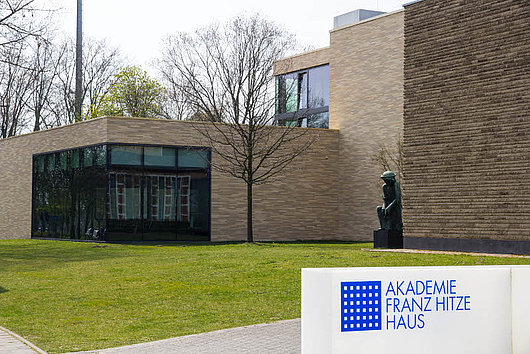
4th Science Congress "Waste and Resource Management" 2014, March 27-28, 2014 in Münster
On 27 and 28 March 2014, the Deutsche Gesellschaft für Abfallwirtschaft e.V. (DGAW) organized the fourth "Waste and Resource Management" science congress at Münster University of Applied Sciences. This year, young scientists from all areas of waste and recycling management came together in Münster under the direction of Prof. Dr.-Ing. Many participants attended the event for the second time, which shows that it has a high level of content and also offers very good opportunities to intensify contact between young scientists, professors and representatives from industry.
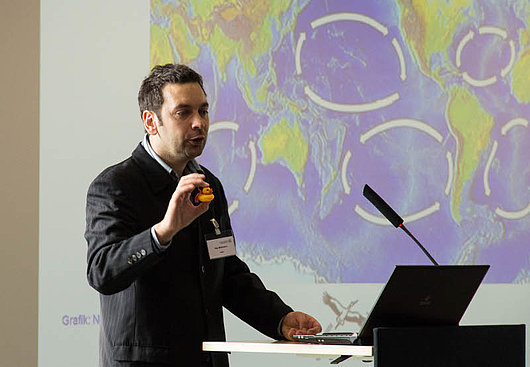
The opening presentation by Nils Möllmann from the German Nature and Biodiversity Conservation Union (NABU) on the topic of "Marine litter - facts, consequences, solutions" aroused great interest among those present. The DGAW will continue to pursue this important topic and discuss it at a specialist colloquium on "Plastic waste in German waters" on June 27 in Berlin.
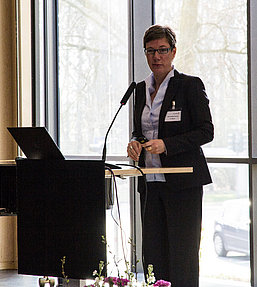
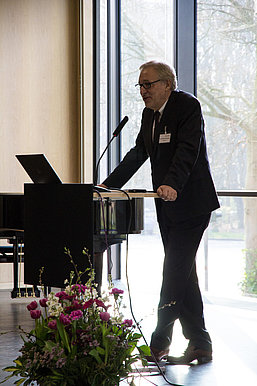
The wide range of topics covered at the fourth scientific congress was well received by the almost 100 participants, which was particularly reflected in the discussions held. During the congress, Prof. Dr.-Ing. Gerhard Rettenberger, long-standing member of the DGAW board and co-initiator of the event, awarded three scholarships, which were paid out thanks to the generous support of numerous sponsors.
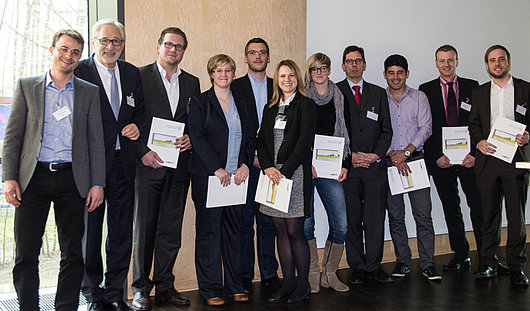
Michael Rutz (FH Nordhausen), Tarek Elzamel (TU Darmstadt) and Oliver Schwab (TU Vienna) received funding this year. This award is intended to enable all three scholarship holders to attend congresses or a summer school.
The prize for the best poster, worth 500 euros, was awarded to Sebastian Kaufeld from the Institute for Processing and Recycling at RWTH Aachen University, who investigated the influence of process parameters on the separation of mixtures of materials. The aim of his work is to set up a test rig with which the retention time behavior of defined individual grain fractions in the collective can be continuously recorded during the screen classification process. Julia Geiping (Münster University of Applied Sciences) also received awards in the poster category for her research on the topic of "Recovery of critical metals from waste electrical and electronic equipment in the mechanical treatment process - status quo determination through plant balancing/material flow analyses" and Verena Trinkel (Vienna University of Technology) for her presentation on the topic of "Challenges in material flow accounting - Case study iron production process".
The prize of 1,000 euros for the best presentation this year went to the University of Duisburg-Essen. The jury, consisting of Prof. Dr.-Ing. Anke Bockreis, Prof. Dr.-Ing. Martin Kranert and Prof. Dr.-Ing. Peter Quicker, awarded the "Waste and Resource Management" science prize in the lecture category to Jan Möller, who investigated approaches for the large-scale implementation of a biological leaching process for the recovery of heavy metals from electrical and electronic waste. Marlies Hrad (BOKU Vienna) was also honored for her presentation "Innovative monitoring tool for the emission assessment of biological waste treatment plants and landfills" and Peter Krämer (Münster University of Applied Sciences) for his work on "Near-infrared-based real-time analysis for substitute fuels - development of regression models for the determination of material group-specific masses".
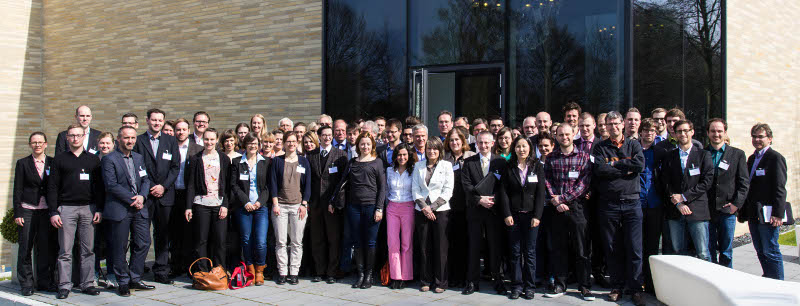
The 2014 award winners: Oliver Schwab (TU Vienna), Prof. Dr.-Ing. Gerhard Rettenberger (DGAW Executive Board), Peter Krämer (FH Münster), Julia Geiping (FH Münster), Jan Möller (University of Duisburg-Essen), Verena Trinkel (TU Vienna), Marlies Hrad (BOKU Vienna), Dr. Alexander Gosten (DGAW Vice President), Tarek Elzamel (TU Darmstadt), Michael Rutz (FH Nordhausen), Sebastian Kaufeld (RWTH Aachen)
Next year, this event will once again give young scientists the opportunity to present their current research and doctoral theses to an expert audience during the two-day congress. The 5th Science Congress "Waste and Resource Management" will take place at the Leopold-Franzens-University Innsbruck under the direction of Prof. Dr.-Ing. Anke Bockreis on March 19 and 20, 2015 .
All pictures of the 4th Science Congress: Gotthard Walter, FH Münster
Vorträge des Kongresses
Part 1 Biological processes I
- Contaminant content in organic waste - possibilities and solutions for reduction
Dr. Jörg Nispel & Frances Vaak, Fraunhofer IWKS
- Innovative monitoring tool for emission assessment of biological waste treatment plants and landfills
Marlies Hrad, BOKU Vienna
- Removing nitrogen during the anerobic digestion of poultry waste using physical methods
PhD Violeta Bravo Sepulveda, TU Cottbus
Part 2 Thermal treatment I
- High-quality solid fuels from agricultural residues, municipal operations, feed and food industry
Harald Gerhards, RWTH Aachen University
- Release of nanoparticles during thermal waste disposal - stability of nanoparticles in flames
Inge-Maria Liesen, KIT
- Pyrolysis of selected mixed metal waste - a value-oriented approach
Michael Gaggl, University of Innsbruck
Part 3 Recycling
- Approaches for the large-scale implementation of a biological storage process for the recovery of heavy metals from electrical and electronic waste
Jan Möller, University of Duisburg
- Reduction of dust emissions in waste management with the rotary dust collector to be developed
Michael Rutz, FH Nordhausen
- Material cycles in masonry construction - challenges for process engineering to recover unmixed material fractions
Mirko Landmann, IAB Weimar gGmbH
- Evaluation of the material composition of buildings and infrastructure facilities using different methods
Fritz Kleemann, TU Vienna
Part 4 Biological processes II
- Microwave-assisted catalytic pretreatment of lignocellulosic residues to increase fermentability
Gunter Weißbach, University of Rostock
- Effects of various pretreatment methods on anaerobic mixed microflora to enhance MCFAs production
Tarek Elzamel, TU Darmstadt
- Amended biowaste ordinance from a postmodern societal perspective
Anna Maria Currin, Saarland University
Part 5 Material flow management
- Conceptual material flow management using the example of a second-generation biorefinery
Jörg Bittner, HS Ostwestfalen-Lippe
- Information - A crucial resource for resource management
Oliver Schwab, TU Vienna
- Near-infrared-based real-time analysis for substitute fuels - development of regression models to determine material group-specific masses
Peter Krämer, FH Münster
Part 6 Thermal treatment II and logistics
- Development of practice-oriented quality tests for household waste collection in the pick-up system
Nico Schulte, University of Rostock
- Agglomeration of fine converter dusts
Anne Dittmar, CUTEC

